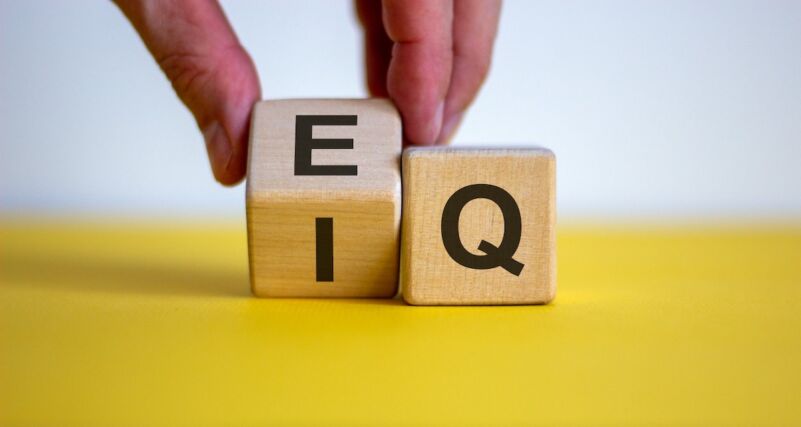Who springs to your mind with this statement: “Highly intelligent but emotionally, less so.” I bet you can think of a few people. It’s something reasonably commonplace in leadership, unfortunately. It’s normal to find people within leadership roles who have a high IQ, but their EQ can be an afterthought. Thankfully, in recent years, there has been more light shone on why EQ and IQ are equally important when leading a team. There’s little to no point in leading a team if you don’t have the capacity to show gratitude, empathy and understanding. An absence of those vital emotional factors will have a drastic impact on how team members feel they can show up at work. We’ve all been there; it can leave you feeling frustrated, misguided, and alone. It’s a scenario that resonates with many of us, so it’s time to consider the importance of Emotional Intelligence (EQ) in leadership.
In the ever-evolving landscape of leadership, a significant shift has occurred. While IQ (Intelligence Quotient) has traditionally been a focal point, the spotlight has shifted to a different aspect of human intelligence: EQ. As leaders, understanding the significance of EQ and how it shapes our interactions and decision-making is essential.
Self-awareness: Understanding Your Own Emotional State and Triggers
So, let’s talk self-awareness. This is the foundation of Emotional Intelligence in leadership (there’s a great podcast I did with Gareth Chick, which you can listen to here). It’s all about recognising and comprehending your emotions and the triggers that influence your behaviour. If you’ve ever wondered why your intelligent/ intellectual boss couldn’t grasp the emotional dynamics within the team, you’re not alone.
It’s essential to consider fundamental attribution error. This is a psychological bias. It leads us to overemphasise personal characteristics and ignore situational factors when evaluating others’ behaviour. In simpler terms, we often assume that everyone thinks and behaves as we do. So when you’re wondering why on earth someone behaved a certain way, it’s because you have awareness of how you would behave and can’t comprehend another way. So, being aware of fundamental attribution error is a good starting point when developing EQ.
But as it turns out, getting to grips with self-awareness is just the start of the journey. I’ve discussed the importance of ensuring a balance between both sides of this coin with Gareth Chick. Prioritising both IQ and EQ in equal measure helps with making more informed decisions, managing emotions effectively, and ultimately becoming more efficient in a role.
Self-management: Ability to Control Your Emotional Reactions and Adapt to Change
Self-awareness opens the door to self-management, a crucial aspect of EQ that goes hand in hand. Leaders who excel in self-management can control their emotional reactions, especially in challenging or high-pressure situations. And that can be a game-changer.
Think of it this way—leaders who can adapt effectively will steer their teams through turbulent times with confidence. In today’s rapidly shifting business environment, adaptability is not just a valuable trait but an essential one.
So, understanding the emotional triggers and learning to stay composed and adaptable when faced with adversity is vital. The ability to manage yourself is not just about personal control; it’s about leading effectively through change and uncertainty.
Social Awareness: Tuning into How Others May Feel

Now, let’s dive into social awareness, the third dimension of EQ. It involves perceiving and understanding not only your own emotions but also those of others. If you’ve ever been in a team where empathy and understanding were lacking, you know the impact it can have on team dynamics and morale.
One of the most important driving forces of a solid team is having a shared vocabulary among team members. This shared vocabulary allows people to speak openly about behaviours and their impact. Building trust is crucial, and having a common framework for providing and receiving feedback helps reduce misunderstandings and conflicts within the team.
Relationship Management: Using Emotional Intelligence to Influence, Communicate, and Build Better Relationships
Last but not least, relationship management is the fourth pillar of EQ. It’s about using your EQ to influence, communicate effectively, and build strong professional relationships. It’s during this pillar of EQ exploration that leaders realise that leadership isn’t just about being in charge; it’s about having people who willingly choose to follow you.
Building a high-performing team requires more than individual self-awareness and self-management. It demands a shared commitment to behavioural norms within the team. This is something that teams can create together based on the company values, and collaborating on the framework can make it feel more meaningful. This framework can then serve as a tool for giving and receiving feedback, ultimately improving team dynamics and performance.
Why EQ Matters More Than IQ in Leadership
As we’ve explored the four pillars of Emotional Intelligence—self-awareness, self-management, social awareness, and relationship management—I would suggest that the importance of EQ likely matters more than IQ in modern leadership. Leadership isn’t just about being smart or making logical decisions; it’s about understanding and effectively managing emotions. Without that, you will have a team that feels their emotions and contributions will not be met in a reasonable or understanding manner.
When leaders envision the future of their organisation, the way they lead their team members plays a vital role in that vision becoming a reality. By exerting a high EQ, teams can connect on a deeper level, share in the vision and be inspired while developing a deeper trust and loyalty.
The Power of Empathy in Leadership
Empathy is a crucial component of emotional intelligence that allows leaders to understand and connect with their team members. Demonstrating empathy builds trust, enhances collaboration, and creates an environment where people feel valued and supported to do their best work.
Leaders who lack empathy often struggle to grasp how others perceive their words and actions. They may be viewed as cold, distant or overly critical – even if that is not their intent. With empathy, a leader can avoid alienating people and diminishing engagement and motivation within the team.
On the other hand, when leaders express genuine care for their people, try to see things from an alternative perspective, and acknowledge others’ challenges and concerns, the impact is tremendously positive. People feel heard, understood and cared for.
As Simon Sinek puts it, “Leadership is not about being in charge. Leadership is about taking care of those in your charge.” Showing empathy is how leaders genuinely take care of their people.
Empathy in action might look like:
– Making time for 1:1 meetings to understand individual needs and challenges
– Actively listening without judgment and validating emotions
– Considering how decisions will impact different team members
– Adjusting language or communication styles to resonate with specific individuals
– Accommodating work arrangements when feasible to support wellbeing
– Expressing appreciation and gratitude frequently
The bottom line is that leading with empathy unlocks discretionary effort and fosters an emotionally intelligent culture. Employees are far more likely to bring passion, creativity and resilience when they feel safe, valued and understood by empathetic leaders.
Practical Ways Leaders Can Build EQ
Hopefully, the importance of EQ in leadership is clear by now. However, emotional intelligence is not necessarily an innate trait – it can be developed over time through intention and practice. Here are some practical tips for leaders looking to enhance their EQ:
– Reflect daily: Set aside 15 minutes each day to review interactions, emotions and triggers. Self-awareness comes from this regular self-reflection.
– Seek feedback: Ask trusted advisors for honest input on your leadership style and emotional impact on others. Be open and non-defensive.
– Observe emotions: Note emotional responses in various situations. Pay attention to your own feelings and read the body language of others.
– Expand perspectives: Put yourself in others’ shoes, especially those who think differently. Consider how you would perceive words/actions.
– Manage stress: Build outlets like exercise, meditation or a relaxing hobby each week. Manage emotions effectively, even in high-pressure situations.
– Improve listening: Listen without interrupting. Summarise what you hear and ask clarifying questions to better understand.
– Read EQ resources: Immerse yourself in books, podcasts, and articles to continue building EQ muscles.
– Find an EQ mentor: Seek out leaders you admire who effectively demonstrate high EQ. Learn from their experiences.
– Practice empathy every day: Make a habit of considering how others might think and feel before acting.
Developing emotional intelligence takes time, self-discipline and commitment. But the rewards for yourself, your team and your organisation make it more than worthwhile.
Written by business coach and leadership coaching expert Dominic Monkhouse. Contact him to schedule a call here. You can order your free copy of his book, Mind Your F**king Business here.

